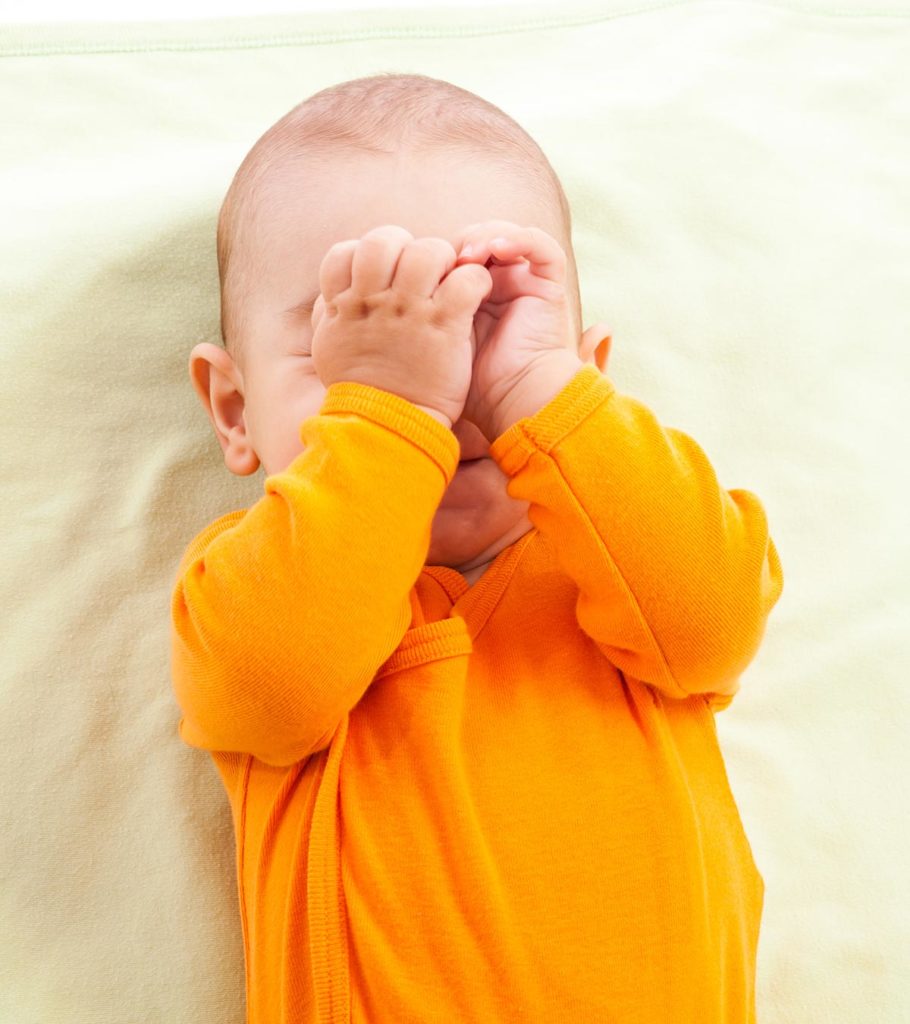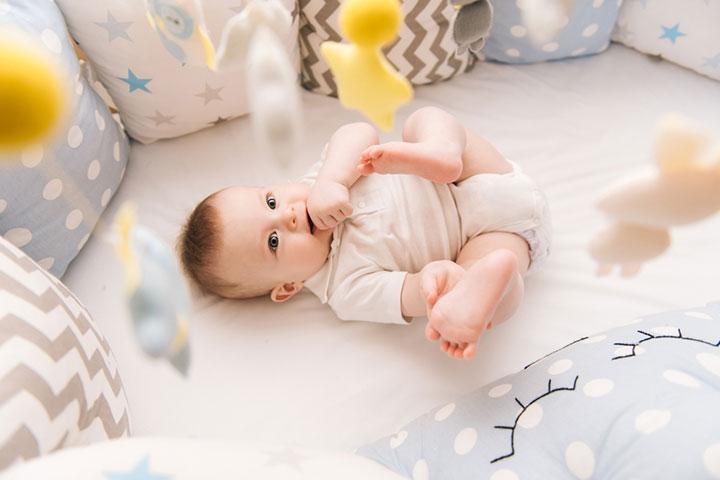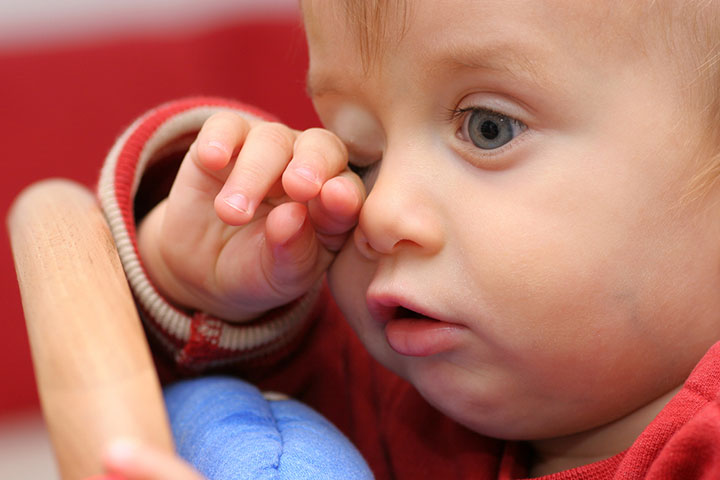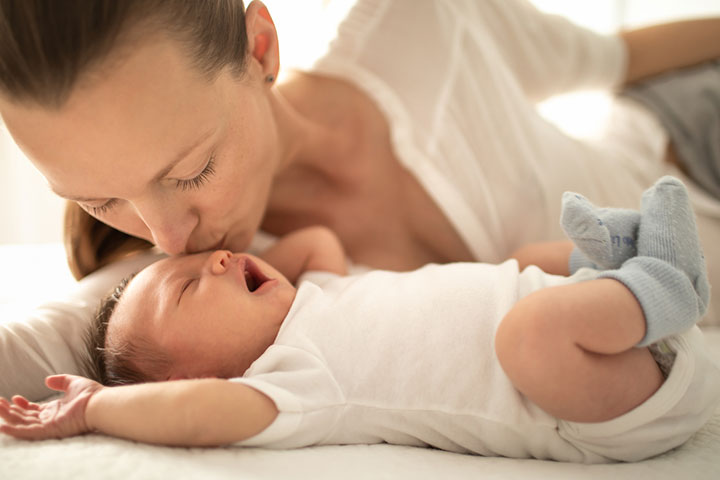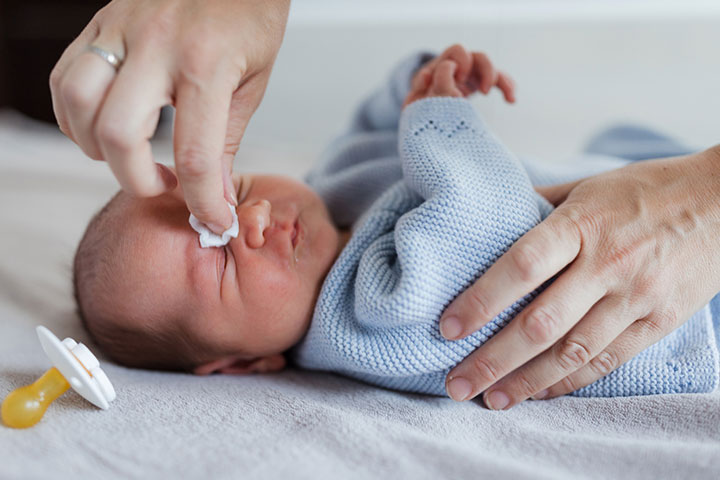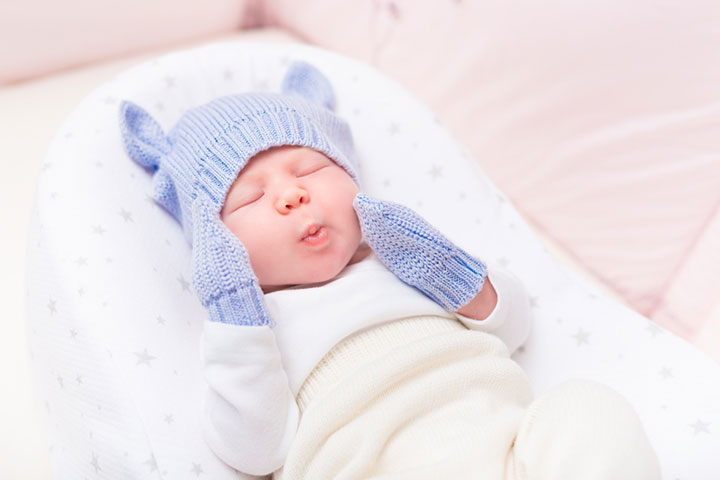Baby rubbing eyes could be a sign of exhaustion and sleepiness (1). However, recent studies have demonstrated that young ones exposed to excess screen time because of using devices like smartphones early in life may develop eye fatigue, which could further lead to increased rubbing of eyes (2). Reading this post could help you understand some probable reasons for babies rubbing their eyes and ways to prevent and manage the condition.
Why Does Your Baby Rub Eyes?
Besides sleepiness and tiredness, there are other possible reasons why babies rub their eyes.
1. Baby is curious
Babies tend to get curious when they develop fine motor skills. Among the things they do then is experiment by touching every part of their body to understand how the body will respond (3).
2. Baby is wondered or amazed
When you notice that your baby is not tired and still rubs eyes, it may be due to the incredible visual stimulation they get while doing so. Babies love the feeling of closing their eyes, rubbing them, and repeating it to see all those visual patterns. You might have also noticed that when you close and rub your eyes, you can see patterns and lights in the closed eyelids. It may be the reason your baby rubs their eyes often.
Preventive measure: Divert your baby’s attention by showing them something more interesting. As your baby’s attention span is short, they will get distracted easily.
3. Baby is sleepy
According to the Centers for Disease Control and Prevention, around 25.2 to 52.5 percent of children are reported to have a short sleep duration in the United States. This could make them feel tired and deprived of their needed hours of sleep. Sleep deprivation can cause drowsiness and eye rubbing in babies. When babies rub their eyes and yawn, it means that they are sleepy and tired. But how does rubbing eyes help your child? When babies get tired, their eyes are fatigued. Just as a massage helps in relieving sore muscles, rubbing eyes helps during fatigue. By doing so, the baby gets relief from soreness and tension created in the muscles of the eyes, around the eyes, and on the eyelids.
Preventive measure: Watch your little one for signs of sleepiness and fatigue. Rubbing and yawning are common signs that indicate your baby requires a nap, says the Child Development Institute. If you notice these first signs of sleepiness, put your baby to sleep immediately to avoid fatigue (and eye rubbing).
Understand your baby’s sleep routine. Establishing consistent sleeping habits, including regular naptime and a bedtime routine, can help prevent eye rubbing caused by sleep deprivation. Once a proper routine is set, ensure that the baby sleeps at a given time even if you are away from home. By doing so, you are not allowing your baby to become tired. When there is no trigger, there will be no eye rubbing.
4. Eyes are dry
Babies may also rub their eyes when they turn too dry. The eyes are protected by a tear film, which evaporates when it is exposed to air for a long time (4). This results in dry eyes, causing discomfort to babies, and they instinctively try to comfort themselves by rubbing their eyes. Because rubbing eyes stimulates tears, which restore moisture in the eyes.
5. There is something in their eyes
Your baby may also rub their eyes if something is irritating them. There could be crustiness around the eye, fluff, or a bit of dust in the eyes. These particles can irritate the eye so much that the baby may want to rub the eyes vigorously. But in this case, rubbing can cause more harm to your little one’s eyes as this may result in particles scratching the eye surface.
Dr. Yuna Rapoport, MD, MPH, a US-based board-certified and fellowship-trained ophthalmologist, says, “If an older child is rubbing their eyes and cannot stop, it may be a sign of early keratoconus (irregular shape of the cornea) and rubbing the eye will cause it to progress. Additionally, incessant rubbing could also signify vernal conjunctivitisiXAlso known as pink eye, when the conjunctiva (outer layer of the eyeball) gets irritated and inflamed. (an extreme form of allergic conjunctivitis).”
If rubbing of the eyes is seen along with crying and eyes turning red, it is a definitive signal that there is some particle in your baby’s eyes. In this case, dip a cotton ball in cold water and squeeze over the eyes slowly to flush away the particle. Wipe off any crustiness using a clean cotton cloth. If your baby is still experiencing irritation, take them to a healthcare provider.
Caution: Don’t use the same cotton plug for both the eyes.
Preventive measure: Do not leave your baby in a place where there is a lot of dust floating around in the air. If it is inevitable, protect the eyes using baby sunglasses.
In addition, eye rubbing accompanied by redness, watering, and fussiness in babies may indicate allergies, despite the fact that eye allergies are rare in infants.
Redness Of Eyes Can Also Be Because Of Conjunctivitis or Eye Flu (5).
In the case of conjunctivitis, there will be sticky discharge from the inner sides of the eyes as well as redness and watering of the eyes.
What to do
- Clean and wash the eyes with fresh tap water three to four times a day.
- Use sterile cotton balls to clean the sticky discharge from the eyes.
- Wait for a day or two; if the redness and discharge do not go, then consult a doctor.
How To Prevent Babies From Rubbing Their Eyes?
To minimize injuries and scratches to the eyes, you need to stop your baby from rubbing their eyes.
If your baby has a habit of rubbing the eyes, try covering their hands with mittens. The Stanford School of Medicine advises putting on baby shirts with full sleeves or baby mittens to cover the hands completely. You can also pull your baby’s long sleeve shirts to cover their hands to prevent them from rubbing their eyes.
You can also hold your little one’s hands away from the face if you think they may rub the eyes. Or, you can distract them by giving a toy or playing music and take their mind off of it.
Staying aware of the probable causes of eye rubbing in babies and preventive measures could help avoid injury or scratching of eyes due to excessive rubbing. It is also wise to know about the signs that might warrant medical intervention (5) (6).
- The baby is not responding to flashing lights past the newborn stage.
- Unless staring at an object, if the baby looks cross-eyed.
- If the baby constantly has strange eye coloration in flash photographs.
- Both eyes are functioning differently.
- Reaction to bright light or an eye infection that does not seem to fade.
- Need to tilt the head when trying to look at a specific object
- Inability to follow a toy with eyes.
- Drooping eyelids
- Eye pain and itchiness
- Constantly watery eyes
If you observe any of the above symptoms, consulting an eye doctor or specialist would be wise. Pediatric ophthalmology is a branch of medicine that specializes in the diagnosis and treatment of eye conditions in infants, children, and adolescents. Eye rubbing in babies and young children may be a sign of an underlying eye condition that can be identified and treated by a pediatric ophthalmologist.
Your baby rubbing their eyes should not be a cause for concern. It might be because they are sleepy, tired, have excess exposure to gadgets or something went into their eyes. But it is advised that you keep their hands covered with mittens and also ensure that their nails are short so that they do not scratch themselves. In case your baby is not responding to flashing lights or has signs of an eye infection, get a consultation from a medical professional immediately to avoid any complications.
Key Pointers
- Rubbing eyes can be a sign of exhaustion, sleepiness, or eye fatigue from excessive screen time in babies.
- Babies may also rub their eyes out of curiosity, amazement, or to relieve eye fatigue.
- Eye rubbing in babies can also be due to sleepiness, dry eyes, or irritation.
- Consistent eye rubbing in babies could indicate conjunctivitis or other eye conditions.
- It’s advisable to clean the eyes with fresh water and seek medical attention if the symptoms persist.
Learn how to safely and effectively clean your child’s or baby’s eyelids. Get tips on the best products to use and how to do it right!
